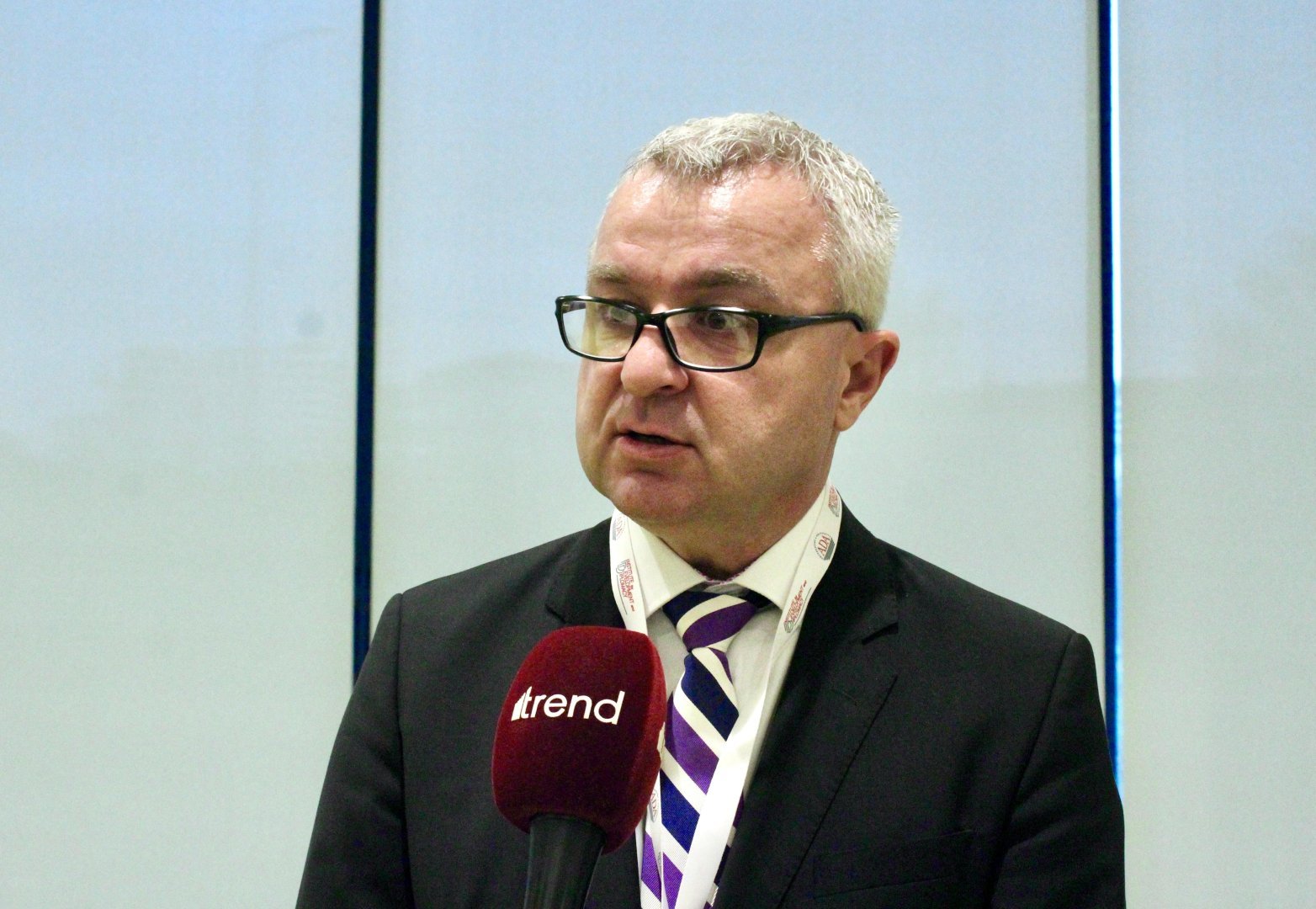BAKU, Azerbaijan, May 21. Azerbaijan plays a central coordinating role in the strategic projects of the Organization of Turkic States (OTS), senior researcher of the Hungarian Institute of International Affairs (HIIA), Professor László Vasa, told in an interview with Trend.
He noted that with its energy resources, transit infrastructure, and diplomatic balance, Baku plays a central coordinating role in the ATS strategic projects.
László added that Azerbaijan is arguably the geopolitical linchpin of the OTS, connecting Central Asia to Europe and the Mediterranean.
According to the expert, Azerbaijan views Hungary as a reliable EU partner that supports its positions (e.g., on Karabakh), a potential conduit for expanding trade and energy flows into the EU, and a like-minded partner in sovereignty-focused, pragmatic diplomacy.
Vasa stressed that bilateral relations between Azerbaijan and Hungary have evolved into a strong and strategic partnership, characterized by deepening economic, energy, cultural, and diplomatic ties.
"Our bilateral cooperation reflects Hungary's broader 'Opening to the East' policy, which seeks to strengthen relations with countries outside the European Union and NATO. Economic relations between the two nations have flourished, with a 29 percent increase in trade turnover in 2024. Hungary's state-owned energy conglomerate," he said.
The expert highlighted that Hungary’s state-owned energy company, MVM, acquired a 5 percent stake in Azerbaijan’s Shah Deniz gas field, securing around 1.5 billion cubic meters of natural gas annually.
"This move is part of Hungary's strategy to diversify its energy sources and reduce dependence on Russian gas. Additionally, Hungary is involved in the development of a Green Energy Corridor, aiming to transmit renewable energy from Azerbaijan to Central Europe, including Hungary," he stated.
Furthermore, Vasa noted that Hungarian companies are actively engaged in infrastructure projects in Azerbaijan, such as the reconstruction of the village of Soltanli in Jabrayil.
"Our countries are also exploring cooperation in transport infrastructure, including railway and road projects, as part of Azerbaijan's broader regional connectivity initiatives," he said.
The expert added that Hungary and Azerbaijan maintain a strategic partnership based on mutual respect and shared interests.
"Energy security and regional stability provide a strategic foundation for cooperation. Azerbaijan is a key partner for Hungary’s energy imports. Not only in terms of gas supply, but also power via the new cable under the Black Sea. Hungary's participation in EU-level discussions on energy diversification often involves advocating stronger ties with the Caspian region, especially Azerbaijan. Energy collaboration enhances Azerbaijan's geopolitical relevance in Europe, while giving Hungary leverage within EU energy negotiations," he said.
The expert also underlined Hungary’s historical support for Azerbaijan’s territorial integrity and its alignment with Baku’s position on Karabakh.
"Hungary has historically supported Azerbaijan’s territorial integrity, aligning itself with Baku’s position on Nagorno-Karabakh. Hungary sees a stable South Caucasus as essential for secure energy transit and broader regional trade. Both countries promote regional cooperation mechanisms, such as the Organization of Turkic States, where Hungary holds observer status, as platforms for dialogue and integration. This stance distinguishes Hungary from some EU states and reflects Budapest's pragmatic, sovereignty-focused foreign policy," he said.
Vasa underscored that mutual benefits continue to strengthen friendly ties and deepen bilateral cooperation.
"Our countries emphasize sovereignty and often express skepticism of Western liberal interventionism. This ideological proximity influences how they engage in multilateral forums. Hungary has supported Azerbaijan in various UN votes, and vice versa. This political reciprocity enhances diplomatic leverage for both nations," he said.
According to Vasa, although Hungary’s domestic gas demand is relatively modest – around 10 billion cubic meters annually – its role in Azerbaijan’s strategy to expand gas exports to Central and Eastern Europe is growing due to several factors.
"First, Hungary is linked to larger regional markets such as Austria, Slovakia, and the Czech Republic. Second, it can influence the coordination of regional energy policy through the Visegrád Group and the Three Seas Initiative. Moreover, Hungary’s interests align with Azerbaijan’s in developing long-term partnerships that go beyond the conventional buyer-seller relationship," he said.
Furthermore, Vasa stated that Hungary is geographically positioned as a gateway to landlocked Central Europe. Despite having lower gas consumption compared to Western Europe, Hungary functions as a key transit hub connecting Southeastern Europe, including the Balkans, to the rest of Central and Eastern Europe. Furthermore, Hungary is one of the few EU countries actively promoting close energy cooperation with Azerbaijan.
"Hungary often sides with Azerbaijan on issues of energy diversification, sovereignty, and regional cooperation. This has made Budapest an important diplomatic ally in navigating the EU's complex energy politics," he said.
Additionally, Vasa noted that the Middle Corridor and projects aimed at enhancing Trans-Caspian connectivity hold great potential for significantly deepening Azerbaijani-Hungarian ties beyond energy, in trade, infrastructure, logistics, and geopolitics. These initiatives form a strategic basis aligned with the interests of both countries, especially amid shifting global trade routes and the EU’s push for diversification.
"As a landlocked EU country, Hungary has a strong interest in multimodal connectivity and East-West logistics. Azerbaijan is a linchpin in this corridor, providing transit through the Port of Alat, rail connections (Baku–Tbilisi–Kars), and political stability and strong logistics investment. Hungary views Azerbaijan as a critical partner in reorienting its trade logistics toward Eurasian markets, while Azerbaijan sees Hungary as a gateway to the EU and Central European markets," he said.
Vasa László emphasized that the Middle Corridor and Trans-Caspian connectivity projects can act as a catalyst for transforming Azerbaijan–Hungary relations from energy-focused ties into a broader strategic partnership encompassing trade and transit, infrastructure development, EU–Caspian connectivity policy, and multilateral engagement.
"It is the first time in the history of OTS to host a summit by an observer state. Moreover, the OTS has its only foreign representation in Budapest. Hungary’s decision to host the Organization of Turkic States (OTS) summit and deepen ties with Turkic states, especially Azerbaijan, is driven by a blend of geopolitical strategy, economic interest, identity politics, and diplomatic positioning. The Budapest summit represents more than symbolic diplomacy; it’s a platform for Hungary to assert itself as a bridge between the EU and the Turkic world, while helping to shape the strategic trajectory of the OTS," he said.
The expert noted that the OTS is undergoing a visible transformation – evolving from a primarily cultural-linguistic union into a more geopolitically and economically active actor. This development holds important implications for Hungary – the only EU member with observer status – offering both strategic opportunities and potential diplomatic friction within the EU.
"Founded in 2009 as the Turkic Council, the OTS initially focused on promoting common Turkic language and heritage, strengthening educational and cultural exchange, and fostering historical narratives and identity among Turkic peoples," the expert said.
According to him, the past five years have marked a turning point for the organization. The OTS is taking coordinated positions on regional security (e.g., Karabakh), sovereignty, and non-Western alignment and increasing military cooperation and defense dialogue, particularly between Turkiye, Azerbaijan, and Central Asian states. In economic terms, there is a growing emphasis on transport and infrastructure development (Middle Corridor, Trans-Caspian initiatives), digital and energy cooperation, and a joint investment fund is established.
Vasa pointed out that OTS is clearly evolving into a more strategic, economically active, and geopolitically aware actor in Eurasia. This trend offers Hungary new channels for energy, trade, and diplomacy and a platform to assert itself as an EU outlier with Eastern depth.
"However, it also brings risks of friction with Brussels, particularly if Hungary. The future of Hungary’s role will depend on how far the OTS moves toward political integration, whether Hungary can turn observer status into economic influence and soft power. The EU’s tolerance for alternative diplomatic alignments within its member states is also a big question," the expert concluded.







